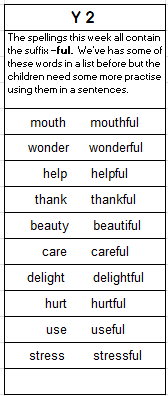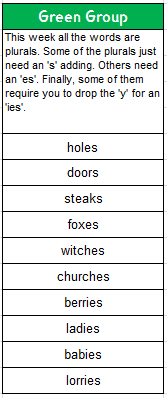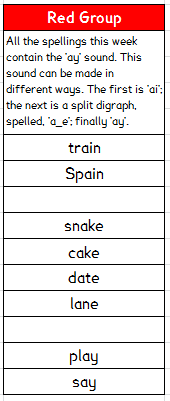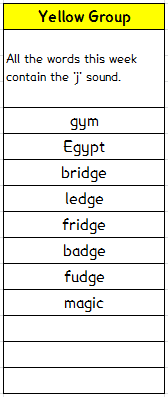10 June 2016
-ent, -ence or –ency
This week’s spellings are all nouns that end in –ence.
Children should learn the words and investigate which words can be changed to have an –ent or –ency ending.
These spellings will be tested on Friday 17 June.
| adolescence (can be changed to adolescent) |
| consequence |
| interference |
| convenience |
| dependence |
| indulgence |
| negligence |
| coherence |
| excellence |
| patience |
10 June 2016
This week’s spellings have been chosen by the children and me because they’re words we’ve noticed lots of us make mistakes on. These spellings will be tested on Friday 17 June.
- favourite
- colour
- excited
- excellent
- different
- altogether
- absolutely
- definitely
- necessarily
- minutes
10 June 2016
Yellow and Red group: I have chosen eight ‘common exception words’ as your spellings this week. These are words which don’t follow the usual rules of phonics.
friend
one
once
our
school
house
your
love
Green group: I will be asking you any ten words from the following list of ‘common exception words’.

10 June 2016
The spellings this week are for everyone in Year 2.

10 June 2016
| wait | walk | wall | want | war |
| warm | was | wash | watch | water |
| wave | way | we | wear | weather |
| week | weight | well | went | were |
| west | what | wheel | when | where |
| whether | which | while | white | who |
| whole | whose | why | wide | wife |
| wild | will | win | wind | window |
| wing | winter | wire | wish | with |
| woman | women | won’t | wonder | wood |
| wood | work | world | would | write |
| written | wrong | wrote |
This week’s spellings are brought to you by the letter ‘w‘. Here is a list of common ‘w‘ words. Go through these words with your child and decide which spellings they already know and which spellings they think they need to focus on learning. A very common error in class is using ‘Wh’ instead of ‘W’ (whent instead of went). On Friday, your child will be assessed through a dictation activity. The following week’s spellings will be based on the whole class’s results in that assessment.
Can your child spot any of our school spelling rules (drop the ‘y’ for an i, double up for a short vowel sound, drop the ‘e’ for ‘ing’)? Can your child spot any words within words to help them remember a spelling (warm)?
Summer Half Term
In line with our Homework Policy, there are no homework tasks or spellings to learn next week because it’s the Summer half-term holiday. Of course, there are plenty of ways to help your child continue learning: get reading, go places, talk lots!
Have a happy and healthy holiday.
20 May 2016
There are no spellings for Year 1 and Year 2 this week due to next week’s themed week.
20 May 2016
This week’s spellings link to our themed ‘Money Week’ and will be tested on Friday 27 May.
- expensive
- extortionate
- discounted
- bargain
- accumulate
- contribute
- squander
- currency
- income
- earnings
As we’re going to be developing our understanding of money next week – what it’s worth, where it comes from, where it goes – it is just as important that the children explore what these words mean as well as how they are spelled.
20 May 2016
The week’s spellings all link in with money week.
- penny
- pound
- amount
- pence
- currency
- Euro
- change
- budget
- charity
Your child has nine spellings to learn and must find their own money word that they will also be tested on.
13 May 2016


